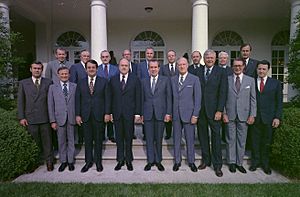Caspar Weinberger facts for kids
Quick facts for kids
Caspar Weinberger
|
|
|---|---|
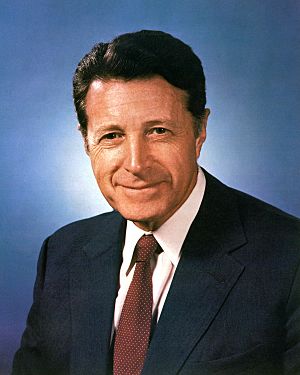
Weinberger in the 1980s
|
|
| 15th United States Secretary of Defense | |
| In office January 21, 1981 – November 23, 1987 |
|
| President | Ronald Reagan |
| Deputy | Frank Carlucci W. Paul Thayer William Taft IV |
| Preceded by | Harold Brown |
| Succeeded by | Frank Carlucci |
| 10th United States Secretary of Health, Education, and Welfare | |
| In office February 12, 1973 – August 8, 1975 |
|
| President | Richard Nixon Gerald Ford |
| Preceded by | Elliot Richardson |
| Succeeded by | F. David Mathews |
| 20th Director of the Office of Management and Budget | |
| In office June 12, 1972 – February 1, 1973 |
|
| President | Richard Nixon |
| Preceded by | George Shultz |
| Succeeded by | Roy Ash |
| Chair of the Federal Trade Commission | |
| In office December 31, 1969 – August 6, 1970 |
|
| President | Richard Nixon |
| Preceded by | Paul Dixon |
| Succeeded by | Miles Kirkpatrick |
| Chair of the California Republican Party | |
| In office 1962–1964 |
|
| Preceded by | John Krehbiel |
| Succeeded by | Gaylord Parkinson |
| Member of the California State Assembly from the 21st district |
|
| In office January 5, 1953 – January 5, 1959 |
|
| Preceded by | Arthur H. Connolly Jr. |
| Succeeded by | Milton Marks |
| Personal details | |
| Born |
Caspar Willard Weinberger
August 18, 1917 San Francisco, California, U.S. |
| Died | March 28, 2006 (aged 88) Bangor, Maine, U.S. |
| Political party | Republican |
| Spouse | |
| Children | 2 |
| Education | Harvard University (BA, LLB) |
| Military service | |
| Branch/service | United States Army |
| Years of service | 1941–1945 |
| Rank | Captain |
| Unit | 41st Infantry Division |
| Battles/wars | World War II |
Caspar Willard Weinberger (August 18, 1917 – March 28, 2006) was an important American leader and businessman. He was a member of the Republican Party. For three decades, he held many important jobs in both California and the U.S. government.
One of his most famous roles was serving as the Secretary of Defense. He worked for President Ronald Reagan from 1981 to 1987. Weinberger was born in San Francisco, California. He fought in World War II in the Pacific Ocean.
After the war, he became a politician in California. He later worked for Presidents Richard Nixon and Gerald Ford. He was the chairman of the Federal Trade Commission. He also directed the Office of Management and Budget. Outside of government, he was a leader at Bechtel Corporation and later at Forbes magazine.
As Secretary of Defense, Weinberger took a strong stand against the Soviet Union. He supported the Strategic Defense Initiative, a plan for missile defense. He was involved in the Iran–Contra affair, a political event. He received a special pardon before a trial could happen. Weinberger was given the Presidential Medal of Freedom and an honorary British knighthood.
Contents
Early Life and Education
Caspar Weinberger was born in San Francisco, California. He was the younger of two sons. His father, Herman, was a lawyer. His mother, Cerise, was a music teacher. His family called him "Cap," a nickname that stayed with him.
Weinberger was a very good student. He went to San Francisco Polytechnic High School. Then he was accepted into Harvard University.
College Years
At Harvard College, Weinberger studied government. He earned his first degree in 1938. He then went on to get a law degree from Harvard Law School in 1941. While at Harvard, he was the president of the student newspaper, The Harvard Crimson. He enjoyed interviewing famous people for the paper.
Career Highlights
Military Service
In 1941, Weinberger joined the United States Army. He became an officer and served in World War II. He was part of the 41st Infantry Division in the Pacific. By the end of the war, he was a captain. He worked on the intelligence staff for General Douglas MacArthur. After the war, he worked as a law clerk.
California Politics
In 1952, Weinberger decided to enter politics. His wife, Jane, encouraged him. He ran for the California State Assembly and won. He was reelected two more times. He helped create the California Department of Water Resources. He also tried to stop the building of a freeway that he thought would block the view of the Bay. He felt good when the freeway was later removed.
In 1962, Richard Nixon chose him to lead the California Republican Party. Later, Governor Ronald Reagan made him chairman of a state commission. He also became California's director of finance. In 1970, Weinberger moved to Washington, D.C. He became chairman of the Federal Trade Commission. He worked to protect consumers.
Working for Presidents Nixon and Ford
Weinberger then worked for President Richard Nixon. He was a director at the Office of Management and Budget. He also became Secretary of Health, Education, and Welfare. While working on the budget, he was known as "Cap the Knife." This was because he was good at cutting government costs. After leaving government, he worked for the Bechtel Corporation.
Secretary of Defense
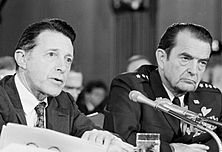
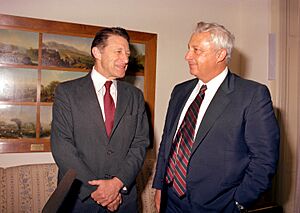
In 1981, President Ronald Reagan chose Caspar Weinberger to be the United States Secretary of Defense. Even though he didn't have much defense experience, he was known as a good leader. He believed that the Soviet Union was a big threat to the United States. He also thought the U.S. military needed to be stronger.
Weinberger strongly supported President Reagan's plan to increase the Department of Defense budget. He focused on making the military ready, sustainable, and modern. At first, he was called "Cap the Ladle" because he pushed for large increases in defense spending.
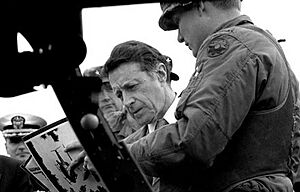
As Secretary of Defense, Weinberger oversaw a huge effort to rebuild the U.S. military. He supported major programs like the B-1B bomber and the "600-ship Navy." These efforts put economic pressure on the Soviet Union. Many believe this pressure helped lead to the end of the Cold War. However, this military buildup also greatly increased the U.S. national debt.
Weinberger was a strong supporter of the Strategic Defense Initiative (SDI). This was a controversial plan for a space- and ground-based missile defense system. He was careful about sending U.S. troops into conflicts. He resigned as Secretary of Defense in November 1987.
Iran–Contra Affair
The Iran–Contra affair was a major political event during the Reagan administration. It involved selling U.S. missiles to Iran. Money from these sales was then given to a rebel group called the Contras in Nicaragua. The U.S. Congress had specifically said no to funding these rebels.
Weinberger was involved in the transfer of these missiles. After he resigned, there were legal proceedings related to the affair. However, before he could be tried, President George H. W. Bush gave him a special pardon in December 1992.
Later Career
Weinberger served as Secretary of Defense for almost seven years. This was one of the longest terms for that position. After leaving the Pentagon, he joined Forbes, Inc., in 1989. He became the publisher of Forbes magazine. In 1993, he was named chairman. He often wrote about defense and national security. He wrote a book called Fighting for Peace about his time at the Pentagon.
Personal Life
In 1942, Caspar Weinberger married Rebecca Jane Dalton. She was an Army nurse during World War II. She later became an author and publisher of children's books. Jane Weinberger passed away in 2009. The couple had two children, a daughter named Arlin and a son named Caspar Willard Weinberger Jr.
Death
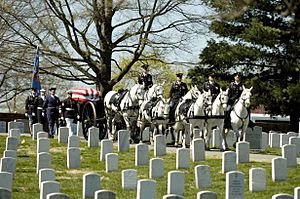
Caspar Weinberger passed away on March 28, 2006, at the age of 88. He died from complications of pneumonia in Bangor, Maine. He was buried at Arlington National Cemetery.
Awards and Honors
- Presidential Medal of Freedom in 1987.
- Honorary Knight Grand Cross of the Order of the British Empire in 1988. This was for his important help with military cooperation between the UK and the U.S., especially during the Falklands War in 1982.
- Gold Star Award from the International Strategic Studies Association.
- Inducted into the United States Army Officer Candidate School Hall of Fame in 1981.
- Golden Plate Award from the American Academy of Achievement in 1975.
Images for kids
See also
 In Spanish: Caspar Weinberger para niños
In Spanish: Caspar Weinberger para niños


